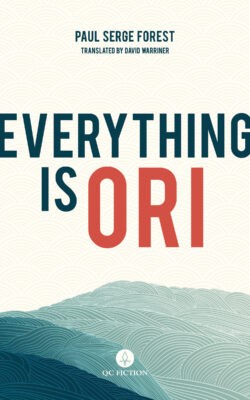Some novels require the reader to stretch their mind to grasp what, exactly, they are reading. Paul Serge Forest’s first novel, Everything is Ori, is one of these. It leaves the reader shuffling through their mental keychain, in search of the right key to figure out the point of a narrative that switches from the pragmatic to the philosophical, while adding a touch of the psychedelic along the way – this read is no walk in the park for the Cartesian mind.
The enigma that is ori is unclear for much of the novel, leaving the meaning of the title obscure until very late in the book. Could it be a seafood-borne toxin that makes everyone throw up? Is it a drug? Why does it provoke a strange kind of blindness? Every character, however insignificant, provides the reader with minute clues as to what is going on.
Everything is Ori QC Fiction
Paul Serge Forest
Translated by David Warriner
$22.95
paper
438pp
9781771863179
The reader is privy to strange infatuations and addictions to sex, drugs, shellfish, and mollusks, all of it described together, sometimes in rather gross detail. But where it gets even weirder (as if it wasn’t odd enough) is how all of it relates to the existential plane. Yes, this is where the reader needs to stretch their mind. Urchins, mussels, shrimp, and other types of crustaceans and mollusks play a pivotal role in the book. At first, all of it comes across as somewhat repulsive – why all these references to sex and masturbation, crustaceans and mollusks? Where is the author going with this? Mixed in with encyclopedic information about the intrinsic versus market value of these sea creatures, we soon understand that this infatuation with sex and seafood goes beyond the Lelarge plant and a Japanese conglomerate looking for a supplier. Our trio of protagonists discover something so incredible that it will change all of humanity. No spoilers here; you have to read the book!
From this odd assembly of characters and events emerges a modern mythical tale. With the absurd snuck into a variety of details – all you need is shellfish and human consciousness – the reader is presented with an elaborate story in which something will change everyone and everything in the world as we know it.
On a linguistic note, I must say that this translated novel is a piece of art. Often, one can feel a translation, even when it is well done, but not here. David Warriner has managed to do more than just transpose Forest’s work into English. His work has all the markings of a novel able to stand on its own. I forecast a long life for the English incarnation!mRb






0 Comments